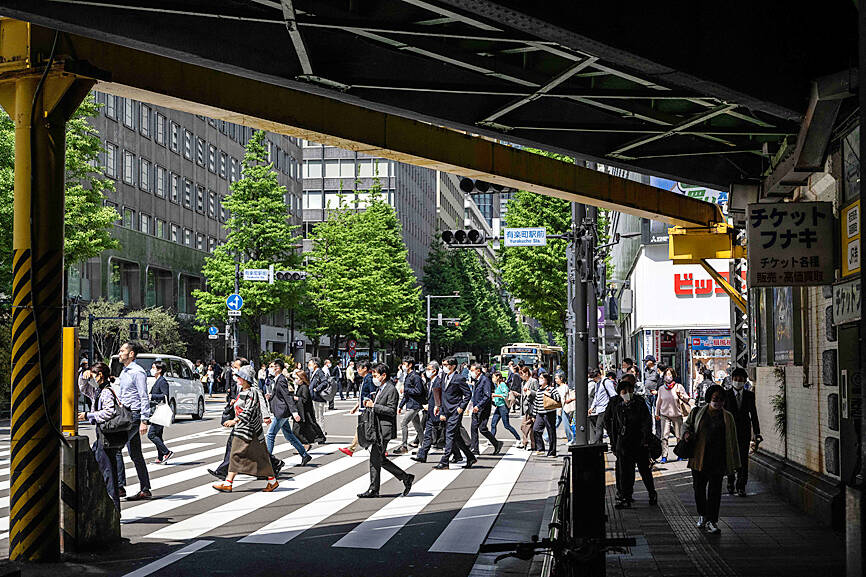Shares in Asia on Friday advanced after Wall Street rallied to its best day since January and the Bank of Japan (BOJ) kept its ultra-lax monetary policy unchanged.
In its first policy meeting under its new governor, Kazuo Ueda, the BOJ kept its key policy rate at minus-0.1 percent even as Japan reported inflation excluding volatile fresh food costs was at 3.5 percent last month.
Japan’s central bank has overshot its inflation target of 2 percent, but expects conditions to worsen since the US and other major economies are thought to be headed for recession.

Photo: AFP
“With extremely high uncertainties surrounding economies and financial markets at home and abroad, the bank will patiently continue with monetary easing, while nimbly responding to developments,” the BOJ said in a statement.
The central bank did remove its “forward guidance” that pledged to keep key policy interest rates at current or lower levels. It said it would needs up to 18 months to conduct a review of monetary policy guidance.
In Taiwan, the TAIEX closed up 167.69 points, or 1.09 percent, at 15,579.18, down 0.15 percent from a week earlier. Turnover totaled NT$222.21 billion (US$7.23 billion).
Tokyo’s Nikkei 225 added 1.4 percent to 28,856.44, up 1.02 percent for the week, while the broader TOPIX gained 1.23 percent to 2,057.48, up 1.1 percent weekly.
In Hong Kong, the Hang Seng rose 0.27 percent to 19,894.57, down 0.9 percent weekly, and the Shanghai Composite surged 1.14 percent to 3,323.27, adding 0.67 for the week.
In Seoul, the KOSPI edged 0.23 percent higher, to 2,501.53, but fell 1.68 percent weekly, while Australia’s S&P/ASX 200 added 0.23 percent to 7,309.2, down 0.29 percent for the week, and India’s SENSEX rose 0.76 percent to 61,112.44, up 2.44 percent weekly.
Additional reporting by staff writer, with CNA

Semiconductor shares in China surged yesterday after Reuters reported the US had ordered chipmaking giant Taiwan Semiconductor Manufacturing Co (TSMC, 台積電) to halt shipments of advanced chips to Chinese customers, which investors believe could accelerate Beijing’s self-reliance efforts. TSMC yesterday started to suspend shipments of certain sophisticated chips to some Chinese clients after receiving a letter from the US Department of Commerce imposing export restrictions on those products, Reuters reported on Sunday, citing an unnamed source. The US imposed export restrictions on TSMC’s 7-nanometer or more advanced designs, Reuters reported. Investors figured that would encourage authorities to support China’s industry and bought shares

FLEXIBLE: Taiwan can develop its own ground station equipment, and has highly competitive manufacturers and suppliers with diversified production, the MOEA said The Ministry of Economic Affairs (MOEA) yesterday disputed reports that suppliers to US-based Space Exploration Technologies Corp (SpaceX) had been asked to move production out of Taiwan. Reuters had reported on Tuesday last week that Elon Musk-owned SpaceX had asked their manufacturers to produce outside of Taiwan given geopolitical risks and that at least one Taiwanese supplier had been pushed to relocate production to Vietnam. SpaceX’s requests place a renewed focus on the contentious relationship Musk has had with Taiwan, especially after he said last year that Taiwan is an “integral part” of China, sparking sharp criticism from Taiwanese authorities. The ministry said

US President Joe Biden’s administration is racing to complete CHIPS and Science Act agreements with companies such as Intel Corp and Samsung Electronics Co, aiming to shore up one of its signature initiatives before US president-elect Donald Trump enters the White House. The US Department of Commerce has allocated more than 90 percent of the US$39 billion in grants under the act, a landmark law enacted in 2022 designed to rebuild the domestic chip industry. However, the agency has only announced one binding agreement so far. The next two months would prove critical for more than 20 companies still in the process

CHANGING JAPAN: Nvidia-powered AI services over cellular networks ‘will result in an artificial intelligence grid that runs across Japan,’ Nvidia’s Jensen Huang said Softbank Group Corp would be the first to build a supercomputer with chips using Nvidia Corp’s new Blackwell design, a demonstration of the Japanese company’s ambitions to catch up on artificial intelligence (AI). The group’s telecom unit, Softbank Corp, plans to build Japan’s most powerful AI supercomputer to support local services, it said. That computer would be based on Nvidia’s DGX B200 product, which combines computer processors with so-called AI accelerator chips. A follow-up effort will feature Grace Blackwell, a more advanced version, the company said. The announcement indicates that Softbank Group, which until early 2019 owned 4.9 percent of Nvidia, has secured a